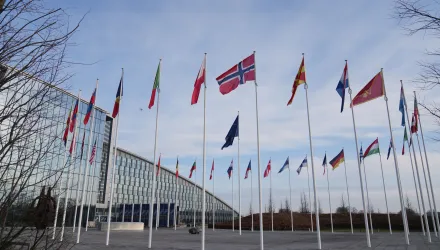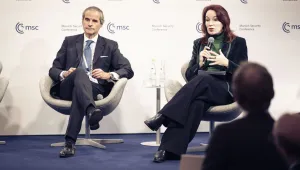President Kennedy’s “Strategy of Peace” speech, given at American University sixty years ago, is a reminder of an important reality of his era and ours: nuclear weapons had an earlier and more complete influence on military and strategic thinking than on foreign policy and the actual conduct of international affairs, particularly in the United States. It remains one of the greatest efforts to remedy this dangerous asymmetry and merits careful reflection by every generation of foreign policymakers.
The nuclear revolution in military affairs is widely accepted and almost total. Victory is impossible in a conflict between adversaries with the means to launch an assured, devastating retaliatory strike after absorbing a nuclear attack from the enemy. Such states are locked into mutual vulnerability in which total war is nonsensical because it would end in the destruction of their own societies. These conditions, first articulated in the 1940s and 1950s, are now largely accepted as definitive of the requirements and limits of nuclear arsenals. Even the U.S. military, which has long sought an escape from mutual vulnerability, accepts that nuclear weapons profoundly limit the military pursuit of political goals.
By contrast, recognition and acceptance of the political implications of nuclear weapons have been dangerously slow. U.S. foreign policymakers realize they cannot conquer Moscow or Beijing, but they have displayed a remarkable willingness to run elevated nuclear risks, including since the end of the Cold War. U.S. policies toward North Korea, Ukraine, and Taiwan tend to test the red lines of other nuclear states and reject compromises which could ease nuclear risks.
During the Cuban Missile Crisis of October 1962, President Kennedy was troubled by a similar tendency in his advisors—their willingness to recommend force and refuse compromise, even at the risk of nuclear war. Seven months later at American University, having avoided what he termed “the final failure,” he proposed principles of international behavior that amount to the political corollary to the nuclear revolution. What is foreign policy prudence in a world where a nuclear war cannot be won, but might nonetheless occur through accident or misperception?
The overriding imperative, President Kennedy said, is that “nuclear powers must avert those confrontations which bring an adversary to a choice of either a humiliating retreat or a nuclear war.” A finer cardinal rule of nuclear statecraft has never been written. It follows that compromise and coexistence are vital. Leaders should seek a cooperative peace based on “effective agreements” and the mutual accommodation of national interests rather than settle for the restive peace of nuclear deterrence. Great powers cannot overcome systemic political differences by force. They should not seek to make the world safe for democracy or communism, but instead “help make the world safe for diversity” and hence, for survival.
Sixty years later, we are at the start of the second grand geopolitical struggle of the nuclear age. Yet our capacity for foreign policy prudence is evidently weaker than at any time since the Cuban Missile Crisis. This anniversary is a reminder that nuclear weapons have dramatically raised the value of a certain political style. We cannot wait for another brush with annihilation to relearn the virtues of compromise, coexistence, and genuine great power peace.
Sankey, Evan. “JFK’s Corollary to the Nuclear Revolution.” June 7, 2023





